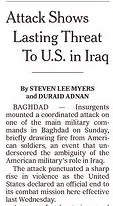 The Upshot
The UpshotJournalists face challenge: Is it really ‘end of combat’ in Iraq?

President Obama announced last week that "the American combat mission in Iraq has ended" and that it's "time to turn the page." But a quick scan of the front page of Monday's New York Times indicates otherwise: "Attack Shows Lasting Threat to U.S. in Iraq."
Although the last U.S. combat troops pulled out of Iraq a few weeks ago — a milestone covered extensively by NBC and MSNBC — 50,000 U.S. noncombat troops are still in country, serving as trainers for the Iraqi military and helping to quell any violent outbursts, like this past weekend's. That official shift, from "combat" to "noncombat," presents a challenge for the media when covering ongoing violence in the country: Is the Iraq war over or isn't it?
"Combat is not over in Iraq," wrote Jamie McIntyre, a former CNN correspondent who now writes the blog Line Of Departure for Military.com. "The war is not won, nor is combat over."
[Photos: Scenes from Iraq]
McIntyre added that, in his opinion, "the U.S. military does not have NON-combat troops. Even the combat support troops are fighting men and women." So the Associated Press, he concluded, is correct in its decision announced Thursday that its reporters will not repeat official suggestions that combat ended Aug. 31.
Tom Kent, the AP's deputy managing editor for standards and production, told staff in a memo that "combat in Iraq is not over, and we should not uncritically repeat suggestions that it is, even if they come from senior officials."

Since AP content runs in more than 1,500 news outlets (including Yahoo! News), the news organization's description of events on the ground could resonate far and wide. Kent wrote in the memo that roughly 4,500 special operations forces — of the 50,000 remaining — "continue to be directly engaged in military operations."
He was proved right two days later, as the AP covered an attack on the Iraqi military headquarters in which fighting between U.S. troops and militants led to 12 deaths. The AP, like the New York Times, pointed out in its account how fighting continues since the official end of "Operation Iraqi Freedom." The AP's headline: "Despite formal combat end, US joins Baghdad battle."
So far, the Times hasn't issued any official guidelines, according to its standards editor, Phil Corbett.
However, Corbett told The Upshot that even though there's not a formal set of guidelines in place, the Times has "been quite careful and clear in our recent stories to help readers understand what these developments do and do not mean."
Indeed, the Times says in a Thursday story that "despite the official end of the combat mission, officials say, fighting will continue." Such fighting, according to the Times, is likely to include "attacks by insurgents and Iranian-backed militias against American troops."
Corbett told The Upshot: "With our reporters still on the ground in Iraq, we should be able to continue to give readers a good idea of the actual conditions. And as always, we'll have to be on guard against shorthand or oversimplification that might not reflect the complex situation there."
Some former network correspondents feel the media hasn't been so careful in describing the current situation on the ground. Fred Francis, a former NBC News correspondent who now does media advising for 15-Seconds.com, appeared Sunday with McIntyre on CNN's media affairs show "Reliable Sources":
Both veteran journalists expressed concern that the media will move on from the Iraq story after Obama's Oval Office address.
"They said the end of combat operations. It's not the end of operations," Francis said. "There's 4,500 Special Forces troops, the best in the world.
"American soldiers are going to be dying in that war, and it's still a war, in my opinion, for the next couple of years, even if the end is in 2011," Francis continued. "We're not going to be gone. It's a story the American media should be covering, and we're not covering it."
Francis also had harsh words for his former employer, which scored a major scoop by having correspondent Richard Engel live via satellite with combat troops crossing the border into Kuwait last month. NBC, along with sister network MSNBC, devoted more than four hours that night to combat troops leaving Iraq — significantly more than Fox News or CNN.
"It was regrettable the way NBC covered it," Francis said.
Host Howard Kurtz asked Francis whyhe felt that way, and the former NBC correspondent said that the network should have "put more emphasis on the fact that we still had 50,000 troops there." (NBC News did mention throughout the broadcast that "noncombat" troops would remain in Iraq, but some watching may still have walked away from the coverage thinking that combat is over when "combat" troops depart).
"So you're saying it was a mini 'Mission Accomplished' moment by MSNBC?" Kurtz asked Francis.
"Indeed," Francis responded. "And it did wonders for the ratings, but it wasn't the full truth."
NBC, CNN and Fox News did not comment on how their networks have recently covered the official end of combat operations in Iraq.
(Photo of Steve Baskis, a U.S. Army specialist who lost his sight while serving in Iraq, as he listens to President Obama's Oval Office address last Tuesday: AP/Charles Rex Arbogast)
Other popular stories on Yahoo!:
• Arizona Republican recruits homeless to run for office
• President Obama quotes rock legend as he takes on critics
• 'Batman' of beach town retires from crime-fighting
